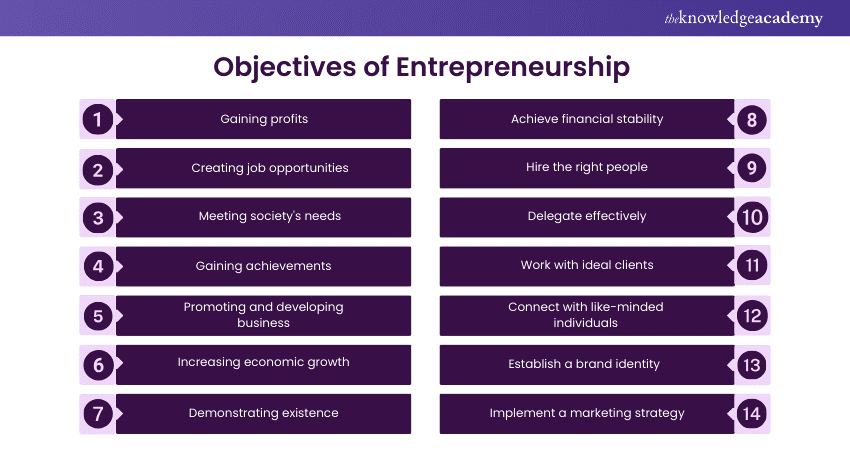We may not have the course you’re looking for. If you enquire or give us a call on +61 272026926 and speak to our training experts, we may still be able to help with your training requirements.
Training Outcomes Within Your Budget!
We ensure quality, budget-alignment, and timely delivery by our expert instructors.

Understanding the Objectives of Entrepreneurship is like travelling a roadmap for success. Just as a skilled navigator carefully plots a course to reach a destination, so too does the Entrepreneur set the sights on a defined objective. These Objectives of Entrepreneurship provide some guiding principles by which to direct and propose Entrepreneurial activities.
In this blog, we discuss the objectives that lead the way and stimulate the activities of a beginning or established Entrepreneur. Get ready to embark on a journey of Entrepreneurial discovery as we explore the Objectives of Entrepreneurship. This blog explores such goals and tries to understand how they come to shape the course of Entrepreneurship.
Table of Contents
1) What is Entrepreneurship?
2) Objectives of Entrepreneurship
a) Gaining profits
b) Creating job opportunities
c) Meeting society's needs
d) Gaining achievements
e) Promoting and developing business
f) Increasing economic growth
g) Demonstrating existence
h) Achieve financial stability
i) Hire the right people
j) Delegate effectively
3) Conclusion
What is Entrepreneurship?
Essentially, Entrepreneurship is about starting and managing a business enterprise to make a profit while taking on financial risks. Entrepreneurs are often thought of as innovators—originators of new ideas, goods, services, and business or procedures. They serve a basic function in the economy: they use their skills and initiative to predict needs and bring a good new idea to market.
Entrepreneurship goes beyond the creation of business. It is an odyssey of continual innovation and problem-solving that allows a business to be successful and a person to find fulfilment, and it causes economic growth and enriches human life.
Objectives of Entrepreneurship

The core objectives of Entrepreneurship, highlighting how these goals contribute not only to personal success but to broader economic and social advancements.
1) Gaining profits
An Entrepreneur needs to raise profits from the business. Through this, the Entrepreneur can carry on the business activity; also, through profits, there are resources available to the business for its further development and innovation. Profit shows how effectively the business is operating and delivering that value to the customer through the Entrepreneur.
2) Creating job opportunities
Entrepreneurs are proven contributors to job creation, which is among the most important contributors to economic stability. By starting new businesses, Entrepreneurs bring in new job opportunities not only for themselves but also for others, thus reducing high levels of unemployment and sparking economic activity.
3) Meeting society's needs
It is largely based on the identification of needs that are not satisfied within a certain community or market. Therefore, Entrepreneurs seek to solve prevalent problems and provide solutions that concern everything from basic needs to quality-of-life improvement and bridging market gaps.
4) Gaining achievements
Milestones really excite Entrepreneurs, launching a new product or entering a new market; sometimes, it is just making a sales target. These all represent business success, personal fulfilment, and vindication of their innovative ideas.
5) Promoting and developing business
Continuing to seek ways to market and develop the business is an intrinsic part of Entrepreneurship. This means expanding the business by marketing, networking, and forming strategic alliances that build brand awareness and secure competitiveness in the market.
Enhance your relationship-building skills with our Building Business Relationships Course – join today!
6) Increasing economic growth
Entrepreneurs are the engines for the country's economic acceleration. Through innovation in new products and services, new employment takes place, and the country's wealth is created; therefore, its economic output is furthered. Their activities enhance a strong economy featuring a lively business sector.
7) Demonstrating existence
Entrepreneurship gives one the opportunity to enter the market and provide his or her voice to the market conversation. This goal is about making a mark and being acknowledged as a leader and a game-changer within the community and without.
8) Achieve financial stability
Financial stability is a cornerstone objective for any Entrepreneur. In general, this involves gaining enough finances to launch and support operations, but it also refers to a financial state in which the business can counteract economic changes and maintain profitability. Financial stability enables Entrepreneurs to invest in growth opportunities and provides a cushion that can support innovative ventures without the immediate pressure of financial return.
9) Hire the right people
As an Entrepreneur, you do not hire a team just to fill up the positions in your structure; you hire a team based on the shared vision of the business and the possession of skills, attitude, and drive. The hiring of the right people cultivates culture in an organisation or business in innovation, efficiency, and loyalty, highly contributing to the long-term success of the business.
10) Delegate effectively
Delegation is the key to growing any business and reducing the burden from the Entrepreneur's shoulders. Good delegation is all about giving the appropriate task to an appropriate individual with the necessary tools and authority to deliver the given task. Not only does it improve productivity, but it also enhances the competence and confidence of the employees.
Boost your workplace efficiency with our Organisational Skills Course – join today!
11) Work with ideal clients
The key is identifying and working with ideal clients. These are people who respect what the business brings to the table, engage positively, and are willing to pay for quality. Working with such clients increases satisfaction rates, gives the best testimonials, and more referrals—all important factors in growing your business.
12) Connect with like-minded individuals
Entrepreneurship can be an isolating experience, but one great way to find a community for support, inspiration, and fresh opportunities is by connecting with like-minded individuals such as other Entrepreneurs, mentors, and industry peers. The common advice and support of peers come in handy for the Entrepreneur to maintain his or her ground, which is essential to weathering the challenges of business ownership.
13) Establish a brand identity
A strong brand identity is what differentiates one product or service from others to a customer. Brand identity is created with lots of care to considerations of what the mission, vision, values, and audience that the organisation is trying to serve are. This, in turn, informs all communication and marketing to have a consistent, identifiable presence in the marketplace.
14) Implement a marketing strategy
A good marketing strategy is crucial for any business to reach a target market and achieve growth. It is based on thorough market research, and strategies are then developed to deliver the right message through the right channels. Implementation of a successful marketing strategy will help increase the visibility that is required to retain existing customers and generate new ones, hence, business success.
Conclusion
These Objectives of Entrepreneurship are a dynamic. They are essential elements of economic and social progress, characterised by a diverse set of pointers aimed at innovation, profitability, and broad-based impact.
Understand how to manage Entrepreneurial risk with our Entrepreneurship Course – join today!
Frequently Asked Questions

To begin your Entrepreneurial journey, start by identifying a compelling business idea and then conduct market research to understand potential customers and competitors. Follow this with a solid business plan that outlines your strategy for operations, marketing, and financial projections.

Entrepreneurs manage risk by thoroughly researching and planning to understand and mitigate potential pitfalls in their market. Additionally, diversifying their product offerings, maintaining a financial safety net, and securing appropriate insurance help protect against unforeseen challenges.

The Knowledge Academy takes global learning to new heights, offering over 30,000 online courses across 490+ locations in 220 countries. This expansive reach ensures accessibility and convenience for learners worldwide.
Alongside our diverse Online Course Catalogue, encompassing 17 major categories, we go the extra mile by providing a plethora of free educational Online Resources like News updates, Blogs, videos, webinars, and interview questions. Tailoring learning experiences further, professionals can maximise value with customisable Course Bundles of TKA.

The Knowledge Academy’s Knowledge Pass, a prepaid voucher, adds another layer of flexibility, allowing course bookings over a 12-month period. Join us on a journey where education knows no bounds.

The Knowledge Academy offers various Personal Development Courses including Entrepreneurship Course, Organisational Skills Course and Building Business Relationships Course. These courses cater to different skill levels, providing comprehensive insights into the Resource Planning Template.
Our Business Skills Blogs cover a range of topics related to Entrepreneurship, offering valuable resources, best practices, and industry insights. Whether you are a beginner or looking to advance your Entrepreneur skills, The Knowledge Academy's diverse courses and informative blogs have you covered.







 Top Rated Course
Top Rated Course




 If you wish to make any changes to your course, please
If you wish to make any changes to your course, please


